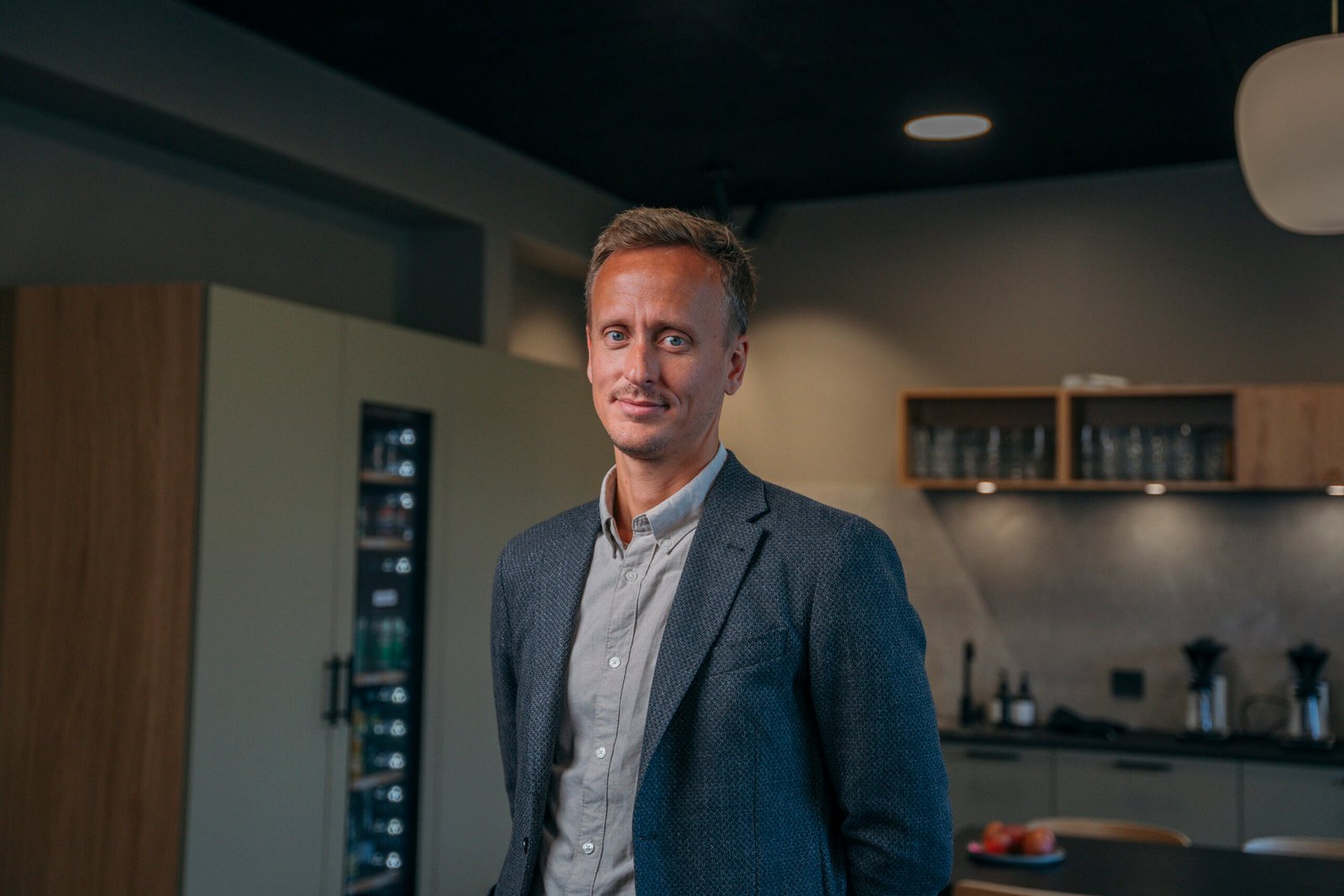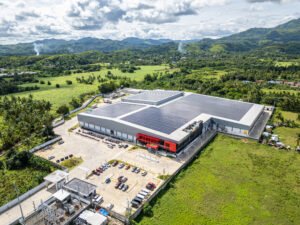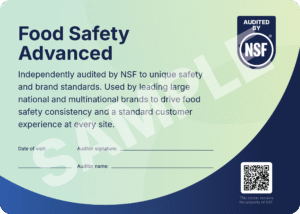Wednesday, 28 January 2026
Noahs and the Streaming Revolution of Food
Daniel Baven, CEO and Co-founder of Noahs As convenience stores face declining fuel margins and shifting consumer expectations, one startup is turning them into the food hubs of the future.…

Daniel Baven, CEO and Co-founder of Noahs
As convenience stores face declining fuel margins and shifting consumer expectations, one startup is turning them into the food hubs of the future. Noahs founded by Daniel Baven and his team is pioneering a new model that blends technology, brand streaming, and modular kitchens to transform underutilized retail kitchens into dynamic digital food networks.
From the “Spotify for Kitchens” concept to plug-and-play digitization that can turn a store into a connected food hub in just hours, Noahs is redefining what convenience means in the modern food economy. In this exclusive interview, Daniel Baven discusses how Noahs is powering the next wave of retail transformation, the $1 trillion opportunity in C-stores, and why the future of food will be streamed, not served.
Reimagining C-Stores: What inspired you to launch Noahs, and why is now the inflection point for reinventing convenience retail?
The spark for Noahs came from watching how every major content industry—music, film, travel—has gone through its streaming revolution. Food hasn’t. Yet we have millions of kitchens sitting in prime retail locations, underutilized and disconnected from the digital economy.
We saw an opportunity to turn those kitchens into digital food hubs. The real inflection point is convergence: consumers expect convenience, platforms demand supply, and retailers need new revenue streams to replace declining categories like tobacco and fuel. Convenience stores are sitting on the infrastructure of the future—they just need the operating system. That’s what Noahs provides.
Digital-First Food Revolution: With the C-store market set to surpass $1T by 2029, how do you see technology reshaping the future of food retail?
We’re standing on the edge of a complete reset.
In five years, most people won’t cook at home the way they do today. It will simply make more sense to tap into a network of nearby retailers streaming great food, made fresh, faster, and cheaper than a home kitchen could ever compete with.
Convenience stores and supermarkets are sitting on the most valuable real estate of the future — the crossroads of local communities. When those spaces go digital, they’ll stop being “shops” and start becoming marketplace hubs for food, experiences, and daily life.
Technology is the enabler, but the change is cultural. It’s about food creators having a new stage, communities having new choices, and retailers becoming the backbone of the next food economy.
Noahs was built exactly for that — to power this transformation and give retailers the tools to move from analogue to intelligent, from transactional to experiential. What’s coming is bigger than food tech. It’s a reinvention of how food exists in society.
Plug-and-Play Platform: Your tech platform can digitize a store with just a Wi-Fi connection. What makes this solution scalable across global chains with different IT maturity levels?
The secret is simplicity.
Most retailers are trapped in heavy legacy systems that make every new integration a nightmare. We flipped that logic. Noahs runs as a layer on top of existing infrastructure, connecting to what’s already there instead of trying to replace it.
That means a store can go live in hours — not months — with zero capex and no new labor. The system plugs into delivery aggregators, POS systems, kitchen screens, and loyalty tools. The moment it connects to Wi-Fi, the store becomes part of a digital network that can sell, operate, and analyze in real time.
It’s built for diversity. Whether it’s a gas station in Denmark, a supermarket in Belgium, or a convenience store in the Philippines, the platform automatically adapts to local tech setups and market conditions. That’s why it scales — because it doesn’t force uniformity, it enables it.
Noahs is not just a tool; it’s a translator between the analogue world and the digital food economy. It’s what the retailers has been looking for, but it didn’t exist until now.
Spotify for Kitchens: You’ve called Noahs’ Brand Platform a “Spotify for Kitchens,” letting retailers stream proven brands and menus directly into their stores. How do you curate the catalogue, and what data drives menu updates?
We’re building a world where food moves like music.
In the same way streaming opened a global stage for artists, we believe culinary creators will soon reach audiences anywhere — not through physical expansion, but through digital distribution. A chef in Copenhagen could see their tacos sold in Dubai the same week. That’s the future we’re shaping with Noahs.
Our brand platform is the foundation for that future. It lets retailers activate proven food concepts directly into their stores, adapting to local tastes and neighborhoods instead of being locked into a single global brand deal. That flexibility is what the industry has been missing — agility, creativity, and cultural relevance.
This shift also enables a complete rework of the food supply chain — simplifying how ingredients, inventory, and production flow through the system. It creates a feedback loop between real-time demand and supply, throttling production, reducing waste, and preparing the industry to fully harness AI.
We’re still early in this journey, but the vision is clear: menus that evolve like playlists, brands that scale without borders, and a supply chain that finally moves as intelligently as the data behind it.
For culinary entrepreneurs, it’s a new way to monetize creativity. For retailers, it’s the chance to become curators of food culture — not just sellers of products.
That’s what “Spotify for Kitchens” really means: a living, breathing ecosystem where food, data, and creativity stream together.
Modular Smart Kitchens: Your kitchens range from 1 to 20 m². How do you ensure operational efficiency, quality control, and food safety across distributed sites?
The next decade will blur the line between retail and hospitality. We believe the world’s biggest food operators won’t be restaurant chains — they’ll be retailers.
To make that leap, retailers will recruit from the culinary world, bringing in chefs, kitchen managers, and operational talent who can run hospitality at scale. What used to be a store will evolve into a network of kitchens, each designed for efficiency, consistency, and speed — powered by technology, not tradition.
Noahs is the platform that enables this transformation. We don’t operate the kitchens — we power them. Our system acts as the operating layer that keeps every recipe, process, and temperature consistent across hundreds of locations. Retailers become the operators; Noahs becomes their digital backbone.
On the hardware side, we’ve developed a full suite of modular kitchens — from compact 1 m² single-brand setups to 20 m² multi-brand environments for service stations, food courts, and supermarket delis. These units are engineered for throughput, safety, and profitability, with built-in monitoring and data loops that ensure every kitchen runs to the same standard. We also anticipate a wave of cross-company innovation in this space — robotics, automated production, drone delivery, and robotaxis changing the future states of the hardware component.
Restaurant kitchens, as we know them today, simply can’t compete with that model. A Noahs-powered multi-brand kitchen can serve multiple food concepts with a fraction of the space, labor, and cost — while maintaining higher quality and consistency.
That’s the future we see unfolding.
Case Study: The Q8 transformation saw food sales jump 374 per cent and basket size rise 228 per cent. Which parts of the Noahs model (tech, brands, kitchens) drove the biggest lift?
Those numbers from Q8 aren’t isolated results — they’re a preview of what happens when retail locations evolve through Noahs’ three-layer model.
Every site that connects our technology platform, brand platform, and modular kitchens can experience a similar transformation. The tech layer creates instant digital access and operational visibility. The brand layer adds proven food concepts that attract new customers and expand sales channels. And the kitchen layer converts that demand into consistent, scalable output with an engine fit for the purpose.
In the quoted Q8 case, all three layers came together at once — which is why the impact was so dramatic. But in most rollouts, we see a natural progression: first digitalize existing shop catalogues, then layer in easy-to-operate brands suited to the current store format, and finally scale through modular smart-kitchens and more advanced brand concepts. Each layer amplifies the next.
What Q8 showed is that this isn’t theory — it’s the future playbook for every retailer. Service stations, supermarkets, and convenience stores can all become high-performing food hubs simply by activating the system step by step. The model works anywhere, because it’s built for the way people live now — connected, on-demand, and expecting quality food wherever they are.
ROI & Adoption Curve: How quickly can retailers expect payback when adopting Noahs, and how do you help de-risk the investment decision?
The short answer: fast.
Because Noahs requires no upfront investment in new labor or capex, most retailers see positive returns within the first few months of activation. The payback curve depends on the depth of adoption — tech alone delivers immediate efficiency and access to new revenue channels, while layering in brands and kitchens compounds the effect.
But beyond ROI, what really de-risks adoption is our model itself. We don’t ask retailers to change who they are — we enhance what’s already there. Noahs plugs into existing infrastructure and workflows, building value on top of current systems instead of replacing them.
We also start small. A single pilot location can validate the impact before scaling to dozens or hundreds. The data from those first sites creates a clear business case — not projections, but proof.
Retailers everywhere are under pressure to reinvent fast, but the risk tolerance is low. Our approach makes innovation incremental, measurable, and cash-positive from day one. That’s why Noahs scales — it rewards courage without demanding blind faith.
Standing Out in a Crowded Space: How does Noahs differentiate from ghost kitchens, Q-commerce players, and aggregator-led solutions?
Ghost kitchens and Q-commerce were great experiments — but they’re built on isolated infrastructure. Each new location means new costs, new staff, and new risk. Aggregators, on the other hand, built digital demand but not digital supply — they own the customers, not the kitchens.
Noahs connects the dots. We’re not building more kitchens; we’re activating the millions that already exist inside retailers. Instead of competing with delivery platforms, we empower retailers to integrate directly with them — turning stores into digital food hubs that can sell across every channel instantly.
Where ghost kitchens chase scale through real estate, Noahs achieves it through connectivity. Where Q-commerce promises speed, we deliver sustainability — a model that actually works economically for both retailers and creators.
Most importantly, we’re not just solving delivery — we’re reinventing food infrastructure. We give retailers the OS, brands, and hardware they need to own their role in the digital food economy.
The future of food won’t belong to aggregators or ghost kitchens — it’ll belong to the platforms that make everyone else scalable. That’s where Noahs sits.
2025 Trends: What’s next for food-tech—robotic kitchens, AI menu personalization, functional food boom? Which of these will most affect the C-store ecosystem?
The short answer? Noahs.
Beyond that, it’s too early to expect any real leapfrogs in robotics. The robotics we see today are impressive, but they’re trapped between eras — built for a world that’s already shifting beneath them. The real step change will come when humanoid robots, like the ones Tesla and Figure are developing, can integrate naturally into existing operations. That’s a 2030 story, not 2025.
The real 2025 trend in food will be the convergence of retailers into food — moving away from being simple convenience hubs to becoming food operators in their own right. That shift will ignite the most dramatic transformation the industry has seen in decades.
AI will play a major role, but not yet in the way most imagine. Everyone’s talking about AI, but its real power depends on something far more fundamental: digitization. That’s what Noahs is building — the digital foundation that makes the intelligent food economy possible.
Geographic Expansion: Which regions outside Denmark and Thailand are next on your radar—and what makes a market “Noahs-ready”?
Officially, we’re now expanding in 4 countries – Denmark, Belgium, Luxembourg, and Ireland. Within 2026, we expect to announce at least ten more countries across three continents joining the Noahs platform. We are currently preparing the best we can to meet the increasing demand for our solution.
A market becomes “Noahs-ready” when retailers recognize that the old model no longer works — when rising costs, labor shortages, and changing customer behavior force a rethink of what retail really is. Europe is leading that shift. High operational costs and rapid transformation are pushing retailers to act faster than ever, and we’re positioned to help them do it in a scalable, low-risk way.
Being Noahs-ready isn’t only about geography and necessity — it’s also about mindset. The retailers who will win this decade are the ones willing to reimagine themselves as food operators. That’s where our platform fits in: as the bridge between today’s analogue retail world and tomorrow’s fast paced food economy.
Capital & Investors: Are you seeking growth capital, and if so, what kind of investors (VC, strategic, corporate) best align with your vision?
We are currently finalizing our latest seed round and are well-capitalized for the current growth phase. Our next major raise — a Series A — is planned for 2026, and preparations are already underway.
Right now, our focus is execution and scale. That said, we’re always open to conversations with investors who see what we see — those who understand that the future of food isn’t about building more restaurants, but about enabling the platforms that connect them.
The best fit for us are partners who bring more than capital — those who share the vision of redefining food infrastructure globally and can accelerate that journey through strategic reach, technology, or market access.
Vision 2030: Paint us a picture: what does a Noahs-enabled convenience store look like in 2030, and what share of its revenue will come from food vs. fuel?
By 2030, the traditional service station will be unrecognizable. The era of fuel as the defining anchor is ending — what comes next will be built around food, experiences, and premium retail.
We’re already seeing early signs of that leapfrog. Elon Musk’s new Tesla Diner is a perfect example — a glimpse of how technology, design, and hospitality can fuse into something people actually want to visit. That’s what excites me: not a finished blueprint, but the open canvas ahead.
I prefer not to lock in a final vision. The real innovation will come from collaboration — from working with retailers, chefs, designers, and local communities to build places that fit their rhythm. Some will focus on food and digital ordering, others on community spaces or hybrid retail experiences. The beauty is that the platform allows for all of it.
What I do know is that the transformation is imminent, and food will be the catalyst that starts it. Once retailers take that step, everything else follows — design, operations, social experiences, even how we define “convenience.”
Over time, Noahs will simply become part of that ecosystem — the invisible layer powering whatever comes next. The real story won’t be about us. It’ll be about how retailers use this opportunity to reinvent what it means to serve their communities.
Suchetana Choudhury
(suchetana.choudhuri@agrospectrumindia.com)
Technology
Capel Marron Farm boosts Australia’s premium food investment credentials
Jan 28, 2026 | Australia
Tetra Pak invests €60Mn in owned pilot plant to advance paper-based barrier technology development
Jan 27, 2026 | Company News
Jollibee Group inaugurates VisMin Commissary in Philippines to support regional expansion
Jan 22, 2026 | Company News
Food Testing
NSF launches retail food safety audit program in ASEAN and Australia
Jan 19, 2026 | Australia
Bringing PFAS testing to the point of need
Jan 16, 2026 | Australia
IMCD opens a Food & Nutrition Laboratory in Cologne
Jan 08, 2026 | Company News
More Popular
Ready-to-stir BLG ingredient offers patient-friendly solution for medical nutrition
Jan 28, 2026 | Company News
Sparkling Ice LIFE SAVERS collab brings four new candy-inspired flavours
Jan 28, 2026 | Beverages
Acker embarks on new era across Europe & Asia with launch of Acker Wine Merchant in Singapore
Jan 28, 2026 | Beverages






